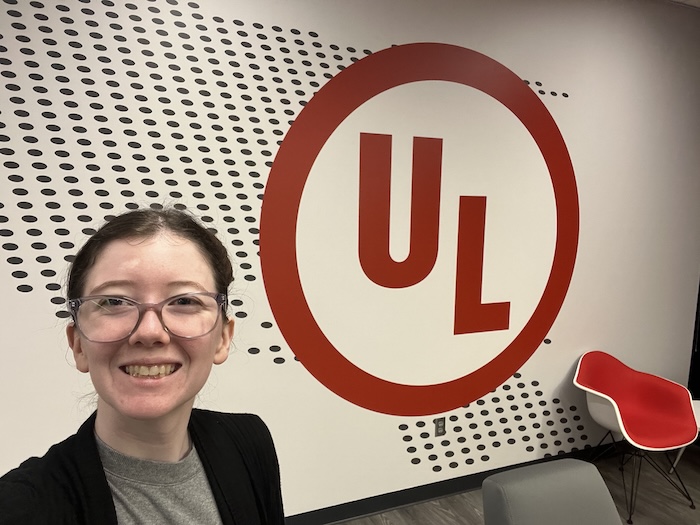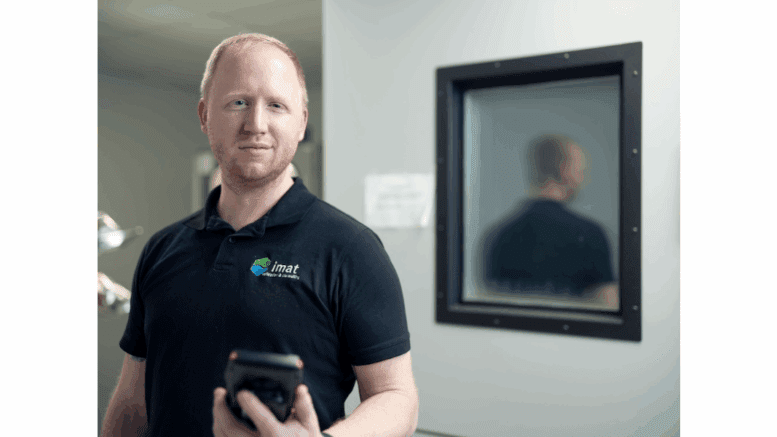Photo above: Anthony London
[This article by Dave Shelles, with a photo by Darnell Wilburn (and another photo ‘provided’), first appeared on the Kennesaw State University website, republished with permission]
In the complex world of chemistry, one can take a direct path from education to industry, as recent Kennesaw State University graduates Mary Smith ’25 and Anthony London ’25 can attest.
The two graduated from KSU’s College of Science and Mathematics in May with bachelor’s degrees in chemistry and stepped right into industry jobs in Marietta – Smith as a laboratory chemist with Underwriters Laboratory Solutions (UL Solutions), and London as an analytical chemist with German company imat-uve.
“Not all students know what their future will be when they choose a science major,” said Associate Professor of Chemistry Wei Zhou, who worked with both Smith and London as undergraduates. “But if you have a curious scientific mind, chemistry is a strong major, and once you get the research skills, you’ll find a solid career.”
Zhou first met Smith and London in 2024, when she taught them both in her advanced analytical chemistry laboratory. The two couldn’t have been more different personality-wise, but they both shared an overwhelming curiosity about science beyond surface knowledge.
“Anthony asks a lot of questions and always wanted to know more than what the textbook provided,” Zhou said. “Mary is quiet, does not talk a lot, but she is a quick study. Sometimes I felt like she could read my mind, anticipating the material with her questions.”
Smith then continued into research with Zhou, and with her learned the instrument-based analytical procedures that led to their current jobs. Zhou’s research group uses gas chromatography mass spectrometry (GC-MS), which identifies substances within a test sample, and high-performance liquid chromatography (HPLC), which separates, quantifies, and identifies specific components in mixtures.
As an emissions chemist at imat-uve, London uses GC-MS to test air quality samples from the surfaces of car interiors to ensure they don’t emit hazardous fumes. At KSU he participated in a research project with Professor of Chemistry Mark Mitchell. He credited the SMART Center and the Office of Student Career Services for valuable assistance outside the lab. In the spring he graduated with the Department of Chemistry and Biochemistry’s award for research in physical chemistry.

Similarly to London, Smith uses HPLC in her job as a laboratory chemist at UL to extract airborne samples from furniture, fabrics, paints and other surfaces to ensure clean surface emissions. She first conducted research with Assistant Professor of Chemistry and Biochemistry Mohammad Halim in forensic chemistry, and in the spring graduated with the department’s award for forensic chemistry.
“The background for the lab work and how to use the specific instruments that I use, I learned while at Kennesaw State,” Smith said. “Most of the things I learned with Dr. Zhou are things I use on a daily basis.”
London took a more winding path to Kennesaw State. He attended college after graduating high school in 2008 but left school to work in various restaurant jobs, lastly as a sales representative for a beverage distributor. London never shook the notion that he should do something else and kept returning to his love for chemistry. He enrolled at KSU part time in 2023 and started full-time studies in Spring 2024.
“I learned how to be a chemist at KSU, because Dr. Zhou and Dr. Mitchell prepared me well for this job,” said London, who earned the department’s award for physical chemistry. “And KSU has so many other resources to help students. It was definitely the right place for me.”
In addition to meeting Zhou in their first analytical chemistry class, Smith and London shared other parallels. They took advantage of KSU’s micro-credentialing offerings by earning their lab safety micro-credentials, which elevated their standings in their respective hiring processes. In every way, Smith and London made the most of their opportunities at KSU.
“I loved all of my professors because they had such enthusiasm for what they were teaching,” Smith said. “Doing research is a big help into diving deeper into chemistry and finding what you like about it because it’s more than just labs and classes and sitting through a lecture about polarity and forming bonds and everything. Through research you really get a sense of what chemistry’s like.”
